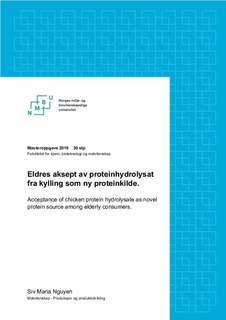| dc.contributor.advisor | Varela-Tomasco, Paula | |
| dc.contributor.advisor | Gaarder, Mari Øvrum | |
| dc.contributor.advisor | Grini, Ida Synnøve | |
| dc.contributor.author | Nguyen, Siv Maria | |
| dc.coverage.spatial | Norway | nb_NO |
| dc.date.accessioned | 2019-08-30T08:36:44Z | |
| dc.date.available | 2019-08-30T08:36:44Z | |
| dc.date.issued | 2019 | |
| dc.identifier.uri | http://hdl.handle.net/11250/2611772 | |
| dc.description.abstract | Samtidig som klimaendringene setter nye krav til ansvarlig ressursbruk, og bærekraftig produksjon, vokser den eldre befolkningsgruppen med et behov for proteinberiket kost for å opprettholde helsen. For å imøtekomme disse samfunnsutfordringene forskes det på utnyttelsen av protein hydrolysater, Denne oppgaven har som formål å skaffe dybdeforståelse av eldres matvalg, og om dette kan drives av helse og/eller bærekraft, for å danne en tydelig retning for utviklingen av produkter tilsatt kyllingprotein hydrolysater fra restråstoff.
For å belyse forskningsspørsmålene ble det benyttet en kvalitativ metode i form av to fokusgrupper (N=15). For å øke dybdeforståelse til de eldres holdninger, barrierer og muligheter ble projektive teknikker benyttet. Resultatene ble behandlet og analysert i Atlas.ti.
Det konkluderes i denne studien at helse er en tydelig driver for eldres matvalg og kjøp. Bærekraft ble sett på som et argument for matvalget, og kan ikke ansees som en driver. De eldre var positive til å benytte kyllingprotein fra restråstoff, men det bærende produktet må tilfredsstille kravene til sluttproduktet for å ikke fremstå som barrierer. Kravene omhandler henholdsvis; smak, konsistens, sunnhet, trygghet, pris, kjennskap og begrenset innhold av tilsetningsstoffer. Respondenten var tydelige på at kyllingprotein burde tilsettes i hverdagsmat med høy konsumeringsgrad, for å ha nytteverdi. God formidling og mer informasjon om produktet og ingrediensen, og dens funksjonelle egenskaper er viktig når sluttproduktet skal kommuniseres til eldre. | nb_NO |
| dc.description.abstract | While the climate change sets new demands on responsible use of resources and sustainable production, the elderly population is growing, with the need of a protein-enriched diet to maintain their health. To address these global challenges, research is being conducted on the utilization of protein hydrolysates. The purpose of this thesis is to gain an in-depth understanding of elderly's food choice, and whether they can be driven by health and/or sustainability. The information is set to form a clear direction for the development of products containing chicken protein hydrolysates from residual raw material.
To elucidate the research questions, a qualitative method in the form of two focus groups was used (N = 15). To increase the in-depth understanding of the elderly’s attitudes, barriers and opportunities, projective techniques were used. The results were processed and analyzed in Atlas.ti.
It is concluded in this study that health is a clear driver for elderly’s food choice and purchases. Sustainability was seen as an argument of the food choice, but cannot be considered a driver. The elderly was positive about using chicken protein from residual raw material, but the carrierproduct must meet the requirements of the end product in order not to appear as barriers. The requirements concern; taste, texture, healthiness, safety, price, familiarity and limited amounts of additives. The respondents were clear that chicken protein should be added in everyday foods with a high degree of consumption, in order to appear with a useful value. Thoughtful communication and more information about the product, its ingredients and its functional properties are important factors when the end product is communicated to the elderly. | nb_NO |
| dc.language.iso | nob | nb_NO |
| dc.publisher | Norwegian University of Life Sciences, Ås | nb_NO |
| dc.rights | Attribution-NonCommercial-NoDerivatives 4.0 Internasjonal | * |
| dc.rights.uri | http://creativecommons.org/licenses/by-nc-nd/4.0/deed.no | * |
| dc.subject | Eldre | nb_NO |
| dc.subject | Proteinhydrolysat | nb_NO |
| dc.subject | Forbrukeraksept | nb_NO |
| dc.subject | Matvalg | nb_NO |
| dc.subject | Novel food | nb_NO |
| dc.title | Eldres aksept av proteinhydrolysat fra kylling som ny proteinkilde | nb_NO |
| dc.title.alternative | Acceptance of chicken protein hydrolysate as novel protein source among elderly consumers | nb_NO |
| dc.type | Master thesis | nb_NO |
| dc.source.pagenumber | 75 | nb_NO |
| dc.description.localcode | M-MAT | nb_NO |

